A fading finest hour?
- Published
While memories of the Battle of Britain remain fresh in the minds of The Few who flew, and the staff who supported them, veterans fear its significance could soon be forgotten by others.
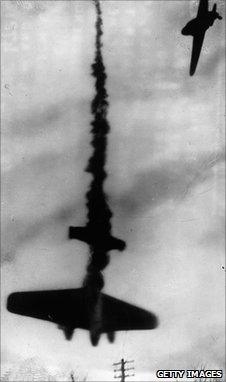
The Luftwaffe lost 1,733 aircraft and the RAF 915 in the Battle of Britain
Seventy years ago the RAF was locked in a life and death struggle with the Luftwaffe in the skies over England.
The three weeks between mid-August and early September in 1940 were decisive for the Battle of Britain.
The bravery of the RAF pilots was captured in Winston Churchill's speech on 20 August when he said "never in the field of human conflict was so much owed by so many to so few".
Those left of The Few, as those pilots became known, are now in their 90s. Some of them fear they will soon not be around to remind people of the events that summer.
Tom Neil was a 20-year-old Hurricane pilot during the battle. He was often scrambled four or five times a day, flying 141 times in all.
"As soon as the scramble order came, you'd have to get off the ground in three minutes," he said.
"You're concentrating like mad, looking for the enemy as you get above the clouds.
"The adrenaline is racing… flak is bursting all around you, everything was exciting.
"When you get back on the ground, you feel like a piece of chewed string. You think Christ, that was rather nasty."
"The Spitfire was a beautiful plane to fly. When you were sitting in it you really were part of the plane," said Spitfire pilot William Walker, now 97.
But while the Spitfire came to symbolise the battle, the workhorse Hurricane was also held in great affection.
"It was the Hurricanes which won the Battle of Britain," Mr Walker said. "They outnumbered us two to one."
The pilots' days ran from dawn to dusk - sometimes from 0330 until almost 2200. A pilot had to be able to fall asleep in an instant, in the brief respite between flights.
Tom Neil flew so many times because he was never seriously injured, or burned, a common hazard for Hurricane pilots.
His friend James Nicolson once described to him "how he smelled like pieces of roast pork, how he could see pieces coming off his arm" in the cockpit.
Nicolson had stayed in his burning craft that day, August 16 1940, to shoot down a Messerschmitt 109.
He managed to bail out in time, and became the only fighter pilot during the Battle of Britain to be awarded a Victoria Cross.
The British planes had little ammunition - only about 30 seconds' worth - and they were firing 7mm machine gun bullets while the Germans had 20mm cannon.
The trick was to get in position - fast - and fire as quickly as possible before getting away. British planes could turn more sharply than the Messerschmitt 109s but otherwise they could not outmanoeuvre them.
One ace, "Ginger" Lacey, told the BBC he had had to bail out nine times in 16 weeks.
Peter Ayerst, who trained Spitfire pilots, said it was impossible to tell who would survive and who would not.
Pilots were kept in the air thanks to the bravery of ground crew, whose job it was to check, patch holes, refuel and re-arm the planes.
They too were risking their lives, particularly between August 15 and September 7, when the Luftwaffe targeted RAF airfields.
Ronald Tooke, then 19, was an engine mechanic for a busy Hurricane squadron.
He remembered the aerodrome being attacked on a sweltering summer day, when he went to sit in the shade by the hangar after testing a plane with a colleague.
"You can't sit there," said his friend, "our planes are coming back".
But the engine noise he heard was a Messerschmitt.
"That was the last I saw of him," said Ronald Tooke. He dived for cover, but his colleague was dead.
What is more, if the pilots had not known exactly where to go, they could not have fought at all.
Radar operators and the observer corps spotted German planes and relayed the information to the operations room, where it was plotted on a huge map.
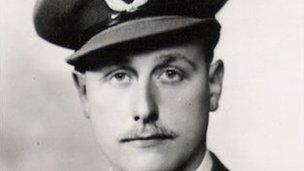
William Walker, the quintessential Spitfire pilot
Hazel Gregory was 18 in 1940 and working as a plotter at the Headquarters of Fighter Command in Uxbridge.
The plotters would hear information through their headphones and instantly start placing Bakelite arrows on the map, adding to it at a rate of about one a second.
She recalled Winston Churchill visiting on September 15 - later seen as the decisive day in the Battle.
"You're too close to it to realise exactly what's happened," the prime minister said. "But you will later and one day you'll tell your grandchildren about it and the part you played in it."
Most of the veterans I spoke to said the Battle of Britain was no longer as well known as it used to be.
School children study World War II, but they usually learn about the evacuations and the Blitz, which affected many millions.
Ronald Tooke recently went into a shop near his Hampshire home, wearing his Battle of Britain badge.
The young shop assistant asked him what it was, so he told her. "And which Battle of Britain would that be?" she asked. And it was not a joke.
Read more on the Battle of Britain and listen to full the interviews with veterans on the Today programme website, external or catch up on the BBC iplayer.
- Published10 July 2015
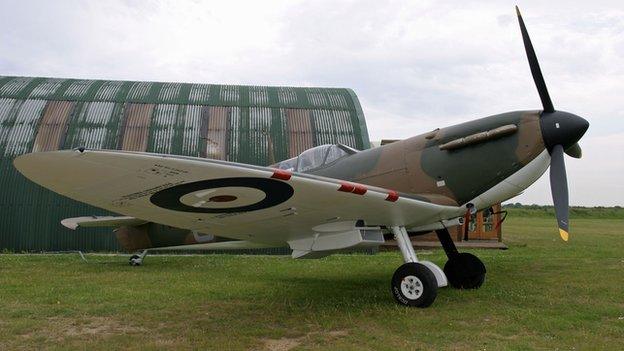
- Published4 July 2015
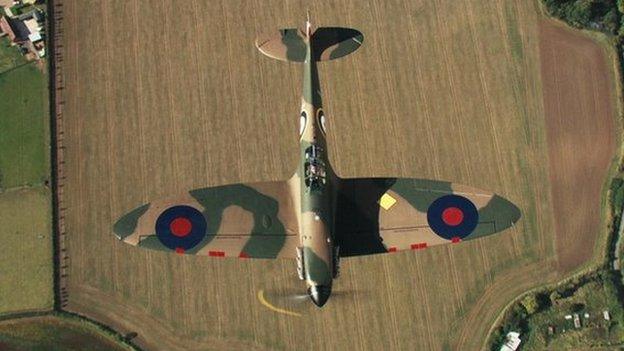
- Published3 July 2015
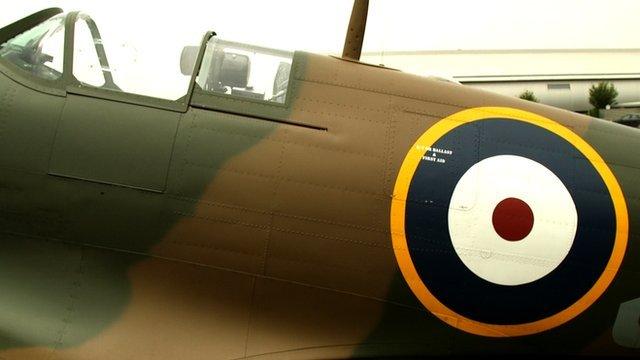
- Published16 August 2010
- Published15 August 2010